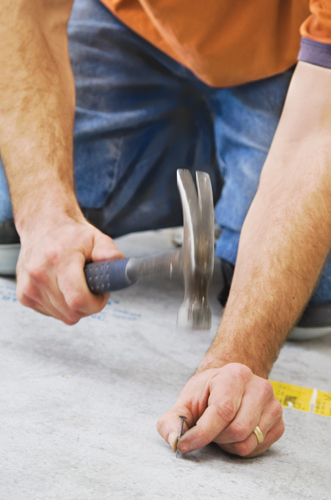Tips for the first time do-it-yourselfer

|
As if they weren't already growing in popularity, do-it-yourself home improvement projects are likely to become even more popular as homeowners continue to cope with the sagging economy.
While it's tempting and perfectly understandable for homeowners to seek ways to save while simultaneously looking to improve their homes, a DIY project can prove more work than expected for first-timers or even veterans. Those thinking of tackling projects themselves should consider the following tips.
* Establish a budget. A successful DIY project may cost you less than hiring a contractor simply because you won't be paying for labor. However, a DIY project can quickly spiral out of control, negating or minimizing the advantages of doing the project yourself. Establish a budget beforehand and stick to it. The longer a project takes, the more likely it is you'll spend money. So consider how much time you have available when establishing a budget.
* Embrace reality. While the idea of saving money in the current economic climate is tempting, homeowners shouldn't fall in love with the idea of doing their own home improvements if they've never even lifted a hammer and nail before. Though some projects are beginner-friendly, others are best left to the professionals. Overestimating your abilities and starting a project you can't possibly finish could end up costing you significantly more time and money than simply hiring a contractor in the first place.
* Enlist some friends or family. Though it might be feasible for a lone individual to tackle a smaller project, it's a good idea to enlist the help of a friend or family member when undertaking a larger project. Most professional contractors are accompanied by at least one assistant when working on a larger project, and there's no reason for a DIY-er to assume he or she can handle a medium- or large-sized project all by himself or herself. Whether it's for safety reasons or for quality control, having a helping hand available is a good idea.
* Clear the project with your local officials first. One of the benefits to hiring a contractor is that a contractor will know how to handle any potential red tape with respect to local zoning laws and any other possible restrictions. However, more than one DIY-er has faced a trial by fire when attempting to undertake their own home improvement project. Rather than learning what you can and can't do on your property as you go along, contact your local zoning board or even a local contractor and seek advice on what you'll need to do legally to make sure your project goes off without a hitch.
* Put safety first. When watching a contractor work on a project, the ease with which many work has a tendency to mask the preparation and safety measures they take before they even hammer their first nail. For a DIY-er, safety should be paramount. Make sure all possible precautions are taken, and don't put too much pressure on yourself to get a job done quickly. While it's important to have a project schedule, don't take safety risks to make sure those scheduling goals are met.







